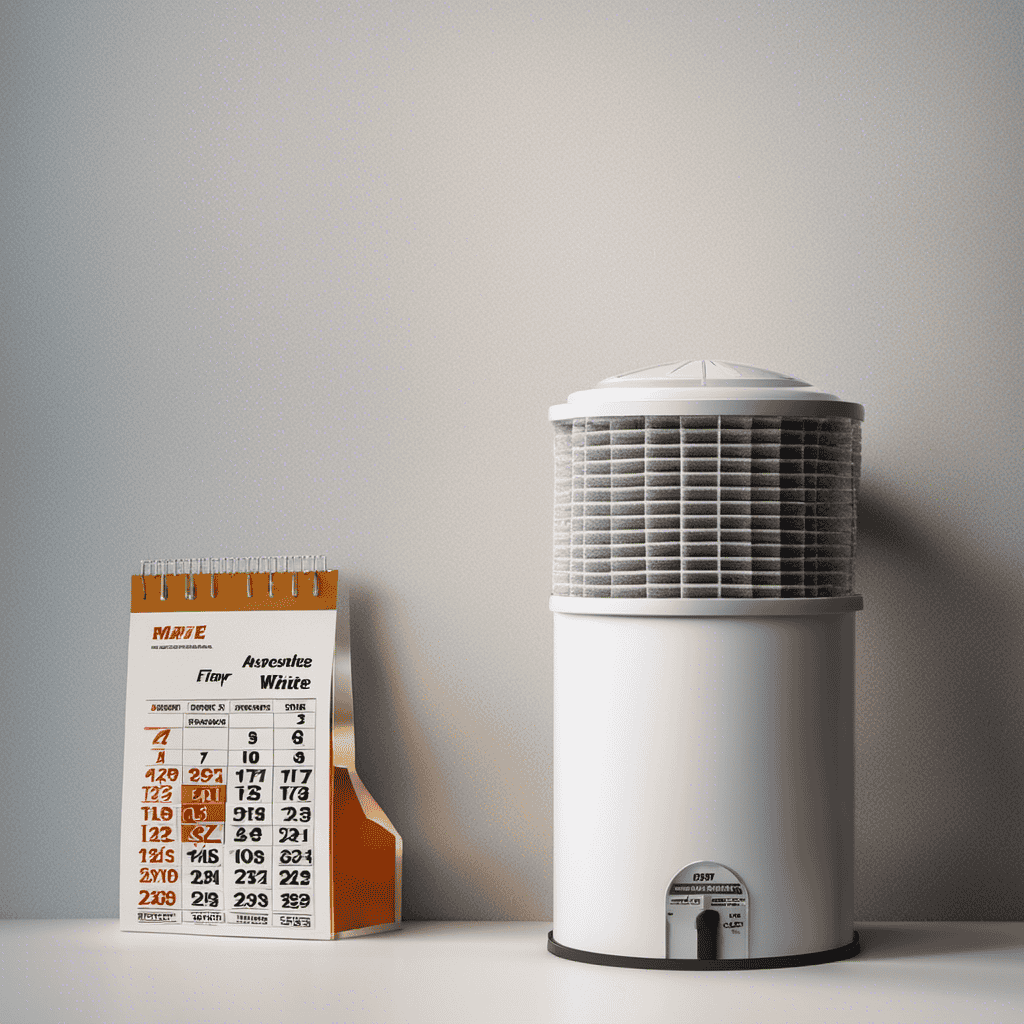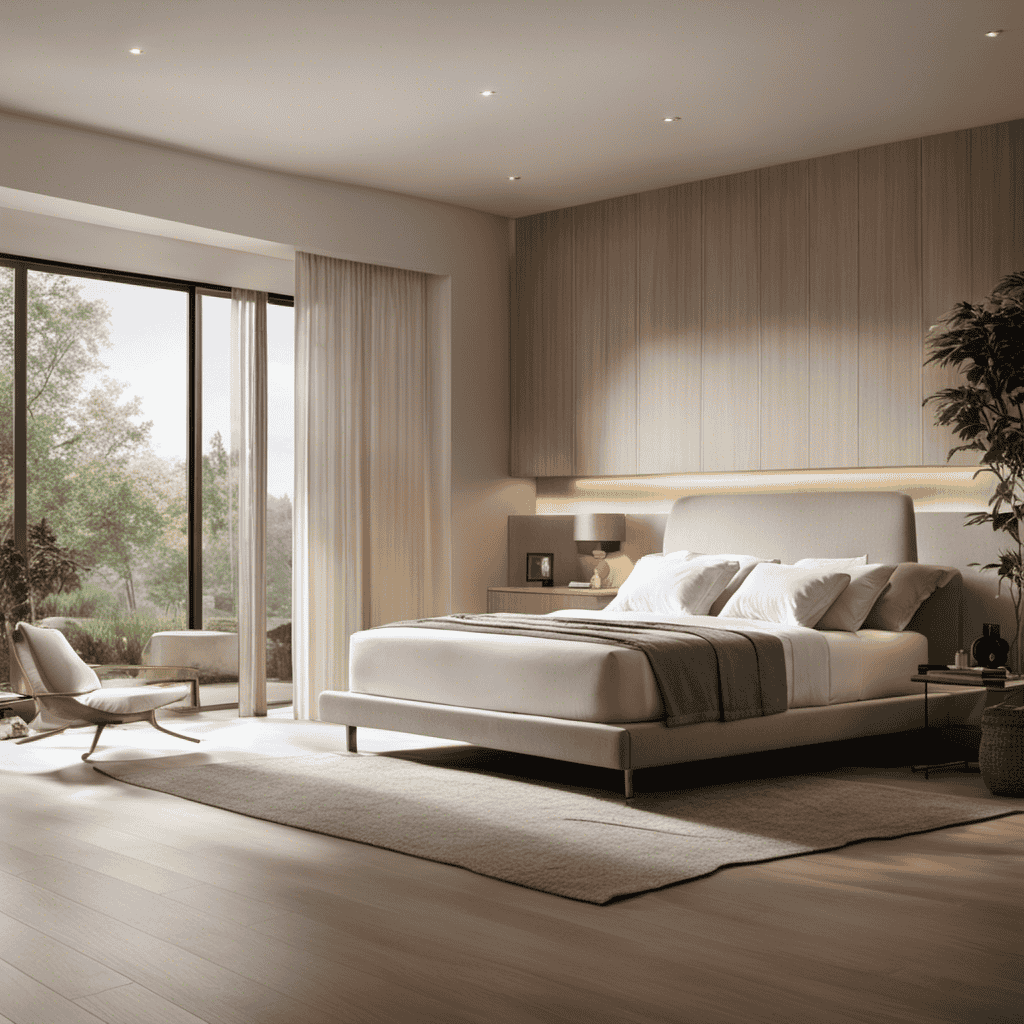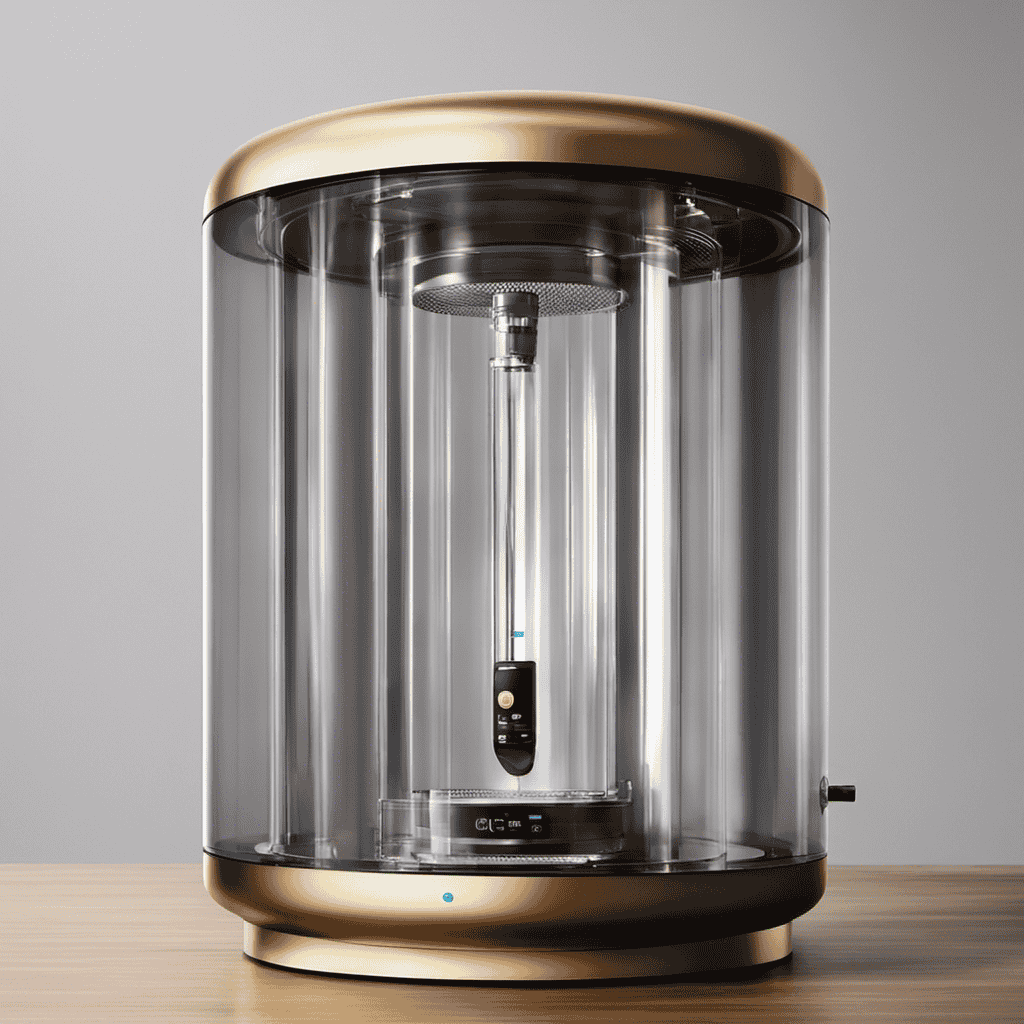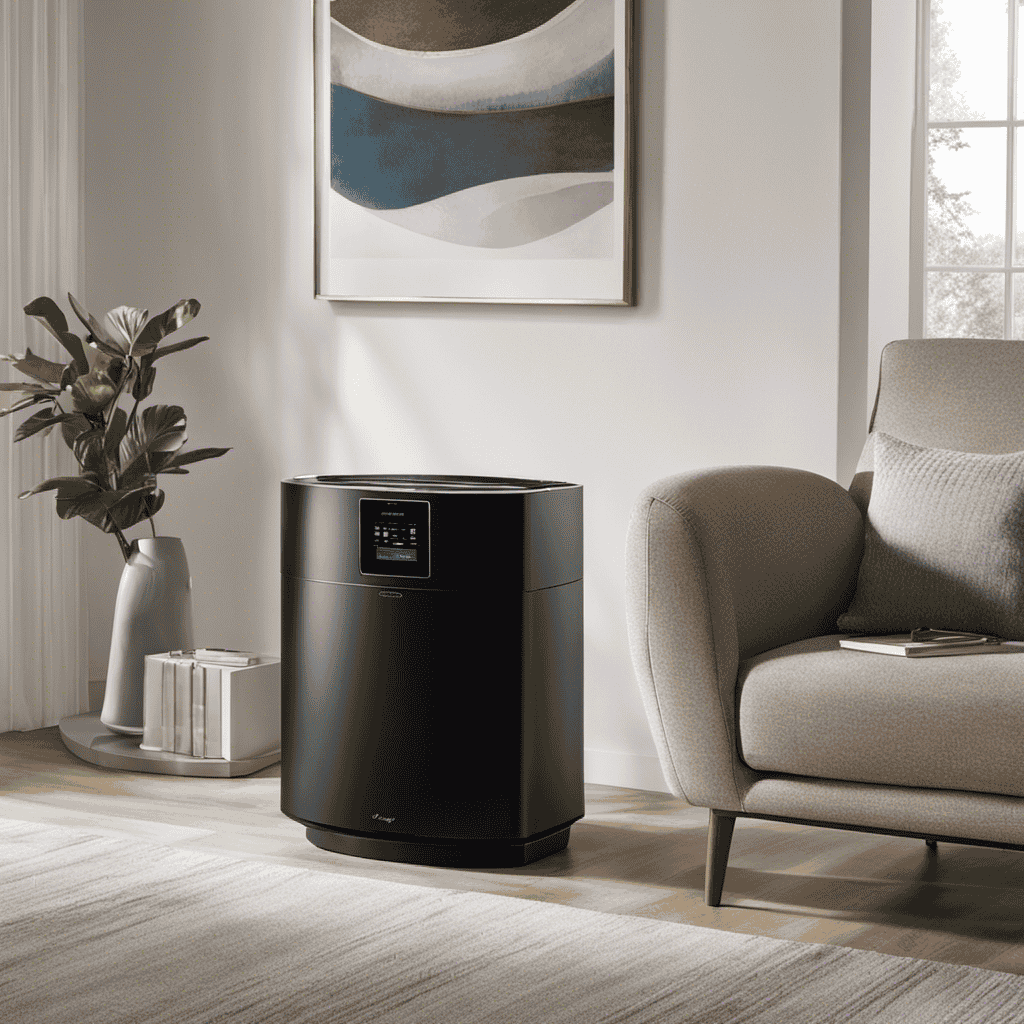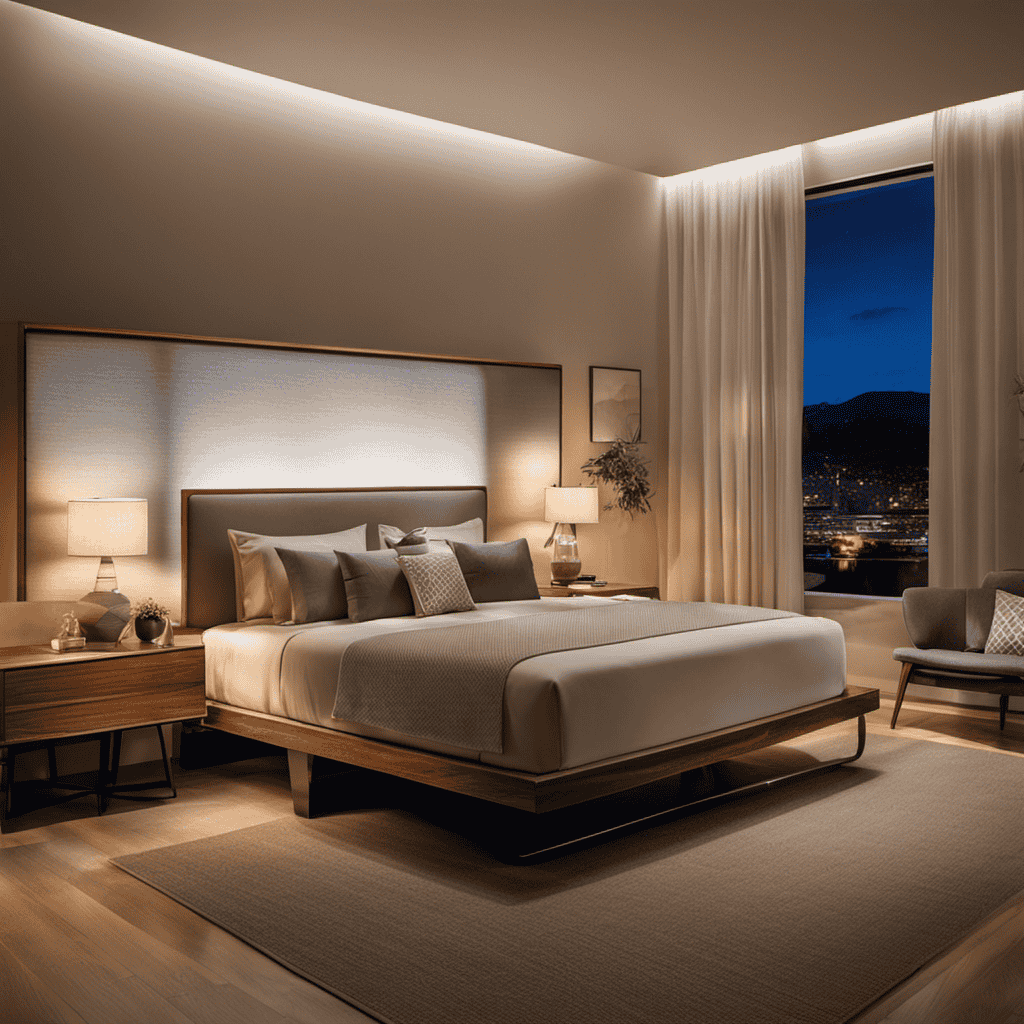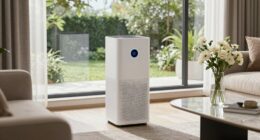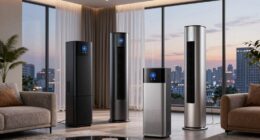Hello there!
Have you ever wondered how often you should be changing the filters in your air purifier? Well, let me tell you, it’s a crucial aspect of maintaining clean and healthy air in your home.
In this article, we’ll dive into the factors that affect filter lifespan, the different types of air purifier filters, and signs that indicate when it’s time for a change. Plus, I’ll share some tips on extending filter life and properly maintaining them.
So, let’s get started and ensure you’re breathing the freshest air possible!
Key Takeaways
- The lifespan and efficiency of air purifier filters can be affected by various factors such as the level of air pollution, size and type of particles in the air, and the quality of the filters themselves.
- Regularly changing air purifier filters is important to ensure optimal performance and effectiveness of the air purifier.
- Signs indicating that it’s time to change filters include reduced air flow, increased allergy symptoms, visible dirt and dust on the filter, and unpleasant odors caused by a clogged filter.
- Maximizing the lifespan of air purifier filters can be achieved through regular maintenance, considering air quality when determining filter replacement frequency, and understanding the role of filter usage in determining replacement intervals.
Factors That Affect Filter Lifespan
There are several factors that can affect how long air purifier filters last. These factors can significantly impact the performance of the filters and their ability to effectively clean the air in your home.
One of the most significant factors is the level of air pollution in your environment. If you live in an area with high levels of air pollution, such as near a busy road or an industrial area, your filters may need to be changed more frequently. This is because the filters will be working harder to capture and remove the pollutants from the air, which can lead to faster clogging and reduced filter lifespan.
Another factor that can affect filter lifespan is the size and type of particles in the air. Filters are designed to capture different types of pollutants, such as dust, pollen, pet dander, and smoke. If your home has a high concentration of any of these particles, the filters may become clogged more quickly and need to be replaced more often.
Additionally, the quality of the air purifier and the filters themselves can also impact their lifespan. Higher quality purifiers are typically more effective at capturing pollutants and may have filters that last longer. It’s also important to follow the manufacturer’s recommendations for filter replacement and maintenance to ensure optimal performance and longevity.
Understanding the different types of air purifier filters is essential for knowing when and how often they should be changed.
Understanding the Different Types of Air Purifier Filters
When it comes to air purifiers, understanding the lifespan and efficiency of filters is crucial. Filters play a vital role in capturing and removing pollutants from the air, but they can only do so effectively for a certain period of time.
In this discussion, we will delve into the factors that affect filter lifespan and efficiency, as well as provide guidance on choosing the right filter for your specific needs.
Filter Lifespan and Efficiency
The lifespan and efficiency of air purifier filters can vary depending on factors such as usage and air quality.
Several factors can affect the efficiency of air purifier filters. Firstly, the frequency of use plays a significant role. Filters that are used more frequently will accumulate more particles and pollutants, leading to reduced efficiency over time.
Secondly, the air quality in the environment also impacts the lifespan and efficiency of the filters. Areas with high levels of pollution or allergens will cause the filters to become clogged more quickly, decreasing their effectiveness.
Regularly changing air purifier filters is crucial for maintaining optimal efficiency. By doing so, you can ensure that the filters are able to effectively capture and remove pollutants from the air. This helps improve indoor air quality, reduce respiratory issues, and create a healthier living environment.
Choosing the Right Filter
Choosing the right filter for your air purifier depends on factors such as air quality and personal preferences. When it comes to different filter options, there are a few key factors to consider.
First, you need to determine the type of pollutants you want to target. For example, if you have allergies, a HEPA filter is a great choice as it can capture small particles like pollen and pet dander.
Second, consider the filter’s efficiency and lifespan. A high-quality filter will not only effectively remove pollutants but also last longer, saving you money in the long run.
Finally, consider any specific features you might want, such as activated carbon filters for odor removal.
Ultimately, the importance of filter quality cannot be overstated, as it directly impacts the air purifier’s effectiveness in improving your indoor air quality.
How Often Should You Change a Pre-Filter
You should regularly check and replace your pre-filter in order to maintain optimal air quality. The lifespan of a pre-filter can vary depending on several factors, such as the level of pollutants in your environment and the frequency of use of your air purifier. If you live in an area with high pollution or if you use your air purifier frequently, the pre-filter may need to be replaced more often.
Regularly changing the pre-filter has several benefits. Firstly, it helps to ensure that the air purifier is functioning at its best. A clogged or dirty pre-filter can hinder the performance of the air purifier, reducing its ability to effectively capture larger particles such as dust and pet dander.
Secondly, a clean pre-filter helps to prolong the lifespan of the HEPA filter. By capturing larger particles, the pre-filter prevents them from clogging the HEPA filter, allowing it to focus on capturing smaller particles. This ultimately extends the life of the HEPA filter, saving you money on replacements.
In the next section, we will discuss the signs that indicate it’s time to change the HEPA filter.
Signs That Indicate It’s Time to Change the HEPA Filter
If you notice a decrease in the performance of your air purifier, it may be a sign that it’s time to change the HEPA filter. Regular maintenance of your air purifier’s filter is crucial to ensure that it continues to effectively remove contaminants from the air. Here are four signs that indicate it’s time to change the HEPA filter:
-
Reduced air flow: If you feel that the air purifier is not blowing out as much air as before, it could be a sign that the filter is clogged. A clogged filter restricts the airflow, making the purifier less efficient in cleaning the air.
-
Increased allergy symptoms: If you or your family members start experiencing more frequent allergy symptoms, such as sneezing, coughing, or itchy eyes, it could be a sign that the HEPA filter is not effectively trapping allergens anymore.
-
Visible dirt and dust on the filter: If the filter appears dirty or visibly covered in dust and debris, it’s a clear indication that it’s time for a replacement. A clogged filter cannot effectively capture pollutants, leading to decreased air quality.
-
Unpleasant odors: If your air purifier starts emitting unpleasant odors instead of fresh, clean air, it’s a sign that the filter is no longer doing its job. A clogged filter can become a breeding ground for bacteria and mold, causing unpleasant smells.
Regular filter maintenance is essential to keep your air purifier functioning optimally and maintaining clean indoor air quality. By paying attention to these signs and changing the HEPA filter when necessary, you can ensure that your air purifier continues to provide you with fresh and healthy air.
Can You Extend the Life of Your Carbon Filter
Extending the life of your carbon filter can be achieved through regular maintenance and proper usage. By taking the necessary steps, you can maximize the efficiency and lifespan of your filter, ensuring that it continues to effectively remove odors, chemicals, and pollutants from the air in your home.
Here are some tips to help you get the most out of your carbon filter:
-
Change the pre-filter regularly: The pre-filter acts as the first line of defense, capturing larger particles and prolonging the life of the carbon filter. By replacing the pre-filter regularly, you can prevent it from becoming clogged and allow the carbon filter to work more efficiently.
-
Keep the filter clean: Regularly vacuuming or brushing off the surface of the carbon filter can help remove any dust or debris that may accumulate over time. This will prevent the particles from blocking the pores of the filter and ensure optimal performance.
-
Use the filter correctly: Be sure to follow the manufacturer’s instructions on how to properly install and use the carbon filter. This includes placing it in the correct position and not overloading it with excessive pollutants.
The Importance of Regular Maintenance for Air Purifier Filters
Regular maintenance is crucial for maximizing the efficiency and lifespan of your air purifier filters. Taking care of your filters will ensure that they continue to effectively remove pollutants from the air in your home or office. Here are some important steps to follow for proper filter maintenance:
-
Clean or replace pre-filters: Pre-filters are the first line of defense for your air purifier. They capture larger particles like dust and pet hair, preventing them from clogging the main filter. Clean or replace pre-filters regularly to maintain optimal airflow.
-
Vacuum or wash the main filter: Depending on the type of filter, you may be able to vacuum or wash it to remove trapped particles. This will help maintain its efficiency and prolong its lifespan.
-
Check for damage: Inspect your filters regularly for any signs of damage. If you notice tears or holes, it’s time to replace the filter to ensure proper functioning.
-
Follow manufacturer’s recommendations: Each air purifier has specific guidelines for filter replacement frequency. It’s important to adhere to these recommendations to ensure optimal performance.
How Air Quality Affects Filter Replacement Frequency
In the previous subtopic, I discussed the importance of regular maintenance for air purifier filters. Now, let’s dive into how air quality affects the frequency at which filters should be replaced.
The quality of the air we breathe has a direct correlation with the recommended filter replacement frequency. When the air is polluted or contains high levels of contaminants, the filters in our air purifiers work harder to trap and remove these particles. As a result, they tend to clog up faster and require more frequent replacements.
To help you understand this correlation better, I have created a table below:
| Air Quality Level | Filter Replacement Frequency |
|---|---|
| Excellent | 6-12 months |
| Good | 4-8 months |
| Fair | 3-6 months |
As you can see, the worse the air quality, the more frequently you should replace your air purifier filters. By doing so, you ensure that your air purifier continues to work effectively in removing pollutants from the air you breathe.
It’s important to regularly monitor the air quality in your environment and adjust your filter replacement schedule accordingly. This will not only maintain the efficiency of your air purifier but also contribute to your overall well-being.
The Role of Filter Usage in Determining Replacement Intervals
To determine when to replace your filters, take into account how frequently you use them and the level of air pollution in your environment. Here are some key factors to consider when it comes to the role of filter usage in determining replacement intervals:
-
Frequency of use: The more often you use your air purifier, the faster the filters will become saturated with particles. If you run your purifier continuously or for long periods of time, you may need to replace the filters more frequently.
-
Air quality: The level of air pollution in your environment has a direct impact on the lifespan of your filters. If you live in an area with high levels of pollution or have significant indoor air contaminants, your filters will need to be replaced more frequently.
-
Filter efficiency: The type and quality of filters you use can also affect their lifespan. Higher efficiency filters, such as HEPA filters, can trap more particles before becoming clogged and needing replacement.
-
Filter maintenance: Proper maintenance, such as regular cleaning and vacuuming of the filters, can extend their lifespan. However, even with maintenance, it is important to monitor the efficiency of your filters and replace them when necessary.
Taking these factors into consideration will help you determine the optimal time to replace your air purifier filters, ensuring that you continue to breathe clean and healthy air.
Tips for Maximizing the Lifespan of Your Air Purifier Filters
In order to maximize the efficiency of my air purifier filters and prolong their lifespan, I have implemented several tips and strategies. By following these guidelines, I have been able to maintain cleaner air in my home while also reducing the frequency of filter replacements.
One important aspect of maximizing filter efficiency is regularly cleaning the pre-filters. These filters capture larger particles and can become clogged over time, reducing the overall effectiveness of the air purifier. By vacuuming or washing these pre-filters on a monthly basis, I am able to prevent them from becoming too dirty and ensure that the main filters can continue to perform optimally.
Another tip I have found helpful is to avoid operating the air purifier in areas with heavy smoke or strong odors. These contaminants can significantly reduce the lifespan of the filters and may require more frequent replacements. By using the air purifier in clean environments, I am able to extend the longevity of the filters.
Additionally, it is important to ensure proper placement of the air purifier. Placing it in a central location in the room allows for better air circulation and filtration. Avoiding obstructions, such as furniture or curtains, also helps to maximize the effectiveness of the filters.
To further illustrate these tips, here is a table summarizing the strategies for maximizing filter efficiency and prolonging filter lifespan:
| Tips for Maximizing Filter Efficiency | Prolonging Filter Lifespan |
|---|---|
| Regularly clean pre-filters | Avoid heavy smoke and strong odors |
| Properly place the air purifier | Use in clean environments |
| Avoid obstructions |
Common Misconceptions About Filter Replacement
Did you know that there are several common misconceptions about when to replace your air purifier filters? It’s important to have the correct information so you can ensure that your air purifier is performing at its best.
Here are four common misconceptions about filter replacement frequency:
-
‘Air purifier filters should be replaced every month.’ While it’s true that filters need to be replaced regularly, the frequency actually depends on several factors, such as the type of filter, the air quality in your area, and the amount of usage.
-
‘You only need to replace the pre-filter.’ Many people believe that only the pre-filter needs to be replaced, but this is not true. The HEPA filter, activated carbon filter, and any other specialized filters in your air purifier also need to be replaced according to the manufacturer’s instructions.
-
‘Filters should be replaced based on a specific time frame.’ Some people think that filters should be replaced every three months or six months, regardless of their condition. However, it’s important to remember that filter replacement frequency should be based on the actual condition of the filter. If it’s dirty and clogged, it’s time for a replacement, regardless of how long it has been since the last replacement.
-
‘You can clean and reuse filters indefinitely.’ While it may be tempting to clean and reuse your filters to save money, this is not recommended. Filters are designed to trap and remove pollutants, and over time, they become less effective. It’s best to follow the manufacturer’s recommendations and replace the filters when necessary.
Understanding these common misconceptions about filter replacement frequency will help you maintain a clean and healthy indoor environment. Remember to always refer to the manufacturer’s instructions for your specific air purifier model to ensure optimal performance.
What Happens if You Don’t Change Your Air Purifier Filters Regularly
In my previous section, I discussed common misconceptions about filter replacement in air purifiers. Now, let’s delve into the consequences and health effects that can arise if you don’t change your air purifier filters regularly.
When air purifier filters are not replaced as recommended, they become less effective in removing pollutants from the air. Over time, the accumulation of dirt, dust, pet dander, and other particles on the filter can clog it, reducing its ability to capture and trap harmful contaminants. This can lead to several negative outcomes:
-
Reduced air quality: A clogged filter allows pollutants to circulate freely in your home, compromising the air you breathe. This can exacerbate respiratory conditions such as asthma and allergies.
-
Increased energy consumption: A dirty filter puts more strain on the air purifier’s motor, causing it to work harder and consume more energy. This not only leads to higher electricity bills but also puts unnecessary stress on the device.
-
Decreased lifespan of the air purifier: The strain placed on the motor due to a dirty filter can shorten the lifespan of the air purifier, requiring you to replace it sooner than expected.
To better understand the consequences of neglecting filter replacement, let’s take a look at the table below:
| Consequence | Description | Health Effects |
|---|---|---|
| Reduced air quality | Poor air quality can lead to respiratory issues, allergies, and other health problems. | Increased risk of asthma attacks, worsened allergies, respiratory irritation, coughing, sneezing, and difficulty breathing. |
| Increased energy consumption | A clogged filter forces the air purifier to work harder, resulting in higher energy consumption. | Higher electricity bills, increased carbon footprint, and more strain on the device. |
| Decreased lifespan of the air purifier | A dirty filter puts extra strain on the air purifier’s motor, causing it to wear out faster. | Shorter lifespan of the air purifier, leading to the need for replacement sooner than expected. |
How to Properly Clean and Maintain Your Filters
Regularly cleaning and maintaining your filters is essential to ensure optimal performance and prolong the lifespan of your air purifier. Here are four steps to properly clean and maintain your air purifier filters:
-
Remove the filters: Start by turning off your air purifier and unplugging it from the power source. Carefully remove the filters from the unit according to the manufacturer’s instructions.
-
Vacuum the filters: Use a vacuum cleaner with a brush attachment to gently remove dust and debris from the filters. Make sure to cover the entire surface of the filters, paying special attention to the crevices and corners.
-
Rinse the filters: Fill a basin with warm water and add a mild detergent. Place the filters in the soapy water and allow them to soak for about 15-20 minutes. Gently agitate the filters to loosen any remaining dirt. Rinse the filters thoroughly with clean water to remove all soap residue.
-
Dry and reassemble: After rinsing, carefully shake off any excess water from the filters. Place them on a clean towel or allow them to air dry completely before reassembling them into the air purifier.
Should You Consider Upgrading to a Higher-Grade Filter
As someone who’s been researching air purifiers extensively, I can confidently say that upgrading to a higher-grade filter can provide numerous benefits.
Not only does it improve the overall air quality in your home, but it also helps to eliminate a wider range of allergens and pollutants.
Additionally, while the initial cost may be slightly higher, the long-term cost effectiveness of a higher-grade filter is undeniable. It typically lasts longer and requires less frequent replacement.
Benefits of Upgrading
You’ll notice the benefits of upgrading your air purifier filters right away. Here are some reasons why upgrading your filters can lead to improved performance:
-
Enhanced filtration: Upgrading to a higher-grade filter means better capture of pollutants, allergens, and airborne particles. This leads to cleaner and healthier air in your home.
-
Increased lifespan: Upgraded filters are designed to last longer, reducing the frequency of filter replacements. This not only saves you time but also money in the long run.
-
Improved air flow: Upgrading to a more efficient filter can enhance the airflow in your air purifier, resulting in better circulation and faster purification.
-
Targeted filtration: Some upgrading options offer specialized filters that target specific contaminants such as pet dander, smoke, or odors. This allows you to tailor your air purifier to your specific needs.
Long-Term Cost Effectiveness
To save money in the long run, consider upgrading your filters for improved performance and longer lifespan. Upgrading your filters not only enhances the quality of air purification but also reduces the frequency of filter replacements, resulting in significant cost savings over time.
When it comes to cost-saving tips for filter maintenance, there are a few techniques to keep in mind. First, regularly clean your filters to remove accumulated dust and debris. This can be done using a vacuum or by gently rinsing the filters with water.
Additionally, consider investing in reusable filters that can be washed and reused multiple times, reducing the need for constant replacements.
Understanding the Manufacturer’s Recommendations for Filter Replacement
If you follow the manufacturer’s recommendations, your air purifier filters should be changed regularly. Proper maintenance is essential to ensure that your air purifier performs at its best and provides clean and healthy air for you and your family.
Here are some important tips to help you understand filter efficiency and ensure your air purifier works effectively:
-
Understand the filter lifespan: Different air purifiers have different filter lifespans. It is crucial to check the manufacturer’s recommendations for your specific model. Some filters may need to be replaced every 3-6 months, while others can last up to a year.
-
Monitor filter condition: Regularly inspect your air purifier’s filters for any signs of dirt, dust, or discoloration. If you notice a significant buildup of contaminants, it may be time to replace the filter, even if it hasn’t reached its recommended lifespan.
-
Consider air quality: The frequency of filter replacement also depends on the air quality in your home. If you live in an area with high pollution levels or have pets or smokers in your household, the filters may need to be changed more frequently.
-
Follow the manufacturer’s instructions: Always adhere to the manufacturer’s guidelines for filter replacement. They have designed the product and have the expertise to determine the optimal replacement schedule.
Frequently Asked Questions
Are There Any Alternative Methods to Extend the Lifespan of Air Purifier Filters?
There are several techniques to extend the lifespan of air purifier filters.
One method is to regularly clean the filters by vacuuming or washing them.
Another option is to use a pre-filter to capture larger particles and protect the main filter.
Additionally, keeping the air purifier in a clean environment, away from dust and debris, can also help prolong the filter’s life.
These DIY maintenance tips can be effective in maintaining the efficiency of air purifier filters.
Can I Use a Different Brand or Type of Filter in My Air Purifier?
When it comes to air purifiers, it’s important to consider the compatibility of different filter options.
While it may be tempting to use a different brand or type of filter, it’s crucial to ensure that it is compatible with your specific air purifier model.
Using an incompatible filter could compromise the effectiveness of your air purifier and potentially damage the unit.
Always consult the manufacturer’s guidelines or seek professional advice before making any changes to your air purifier’s filter.
What Are the Potential Consequences of Not Changing the Air Purifier Filters Regularly?
Not changing air purifier filters regularly can lead to potential health risks and decreased air purification efficiency.
When filters are not changed, they become clogged with dirt, dust, and allergens, reducing their ability to capture and remove these particles from the air.
This can result in poor indoor air quality, which can exacerbate allergy and asthma symptoms, and potentially lead to respiratory issues.
Regularly changing filters is essential for maintaining clean and healthy air in your home.
How Can I Properly Clean and Maintain My Air Purifier Filters?
When it comes to cleaning and maintaining your air purifier filters, effective techniques are key.
I learned this the hard way when I neglected to clean mine regularly. Dust and debris built up, rendering the filters ineffective.
To properly clean them, gently vacuum or rinse with water, ensuring they are completely dry before reinserting. Avoid using harsh chemicals or scrubbing too forcefully, as this can damage the filters.
Regular maintenance will ensure your air purifier works efficiently and keeps your air clean.
Is It Worth Upgrading to a Higher-Grade Filter for Better Air Purification?
Upgrading filter efficiency can be worth it for better air purification. Higher grade filters are designed to capture smaller particles and pollutants, improving the overall air quality in your space. Although they may cost more initially, they can be more cost effective in the long run as they tend to last longer and require less frequent replacement.
Additionally, they provide better protection against allergens and other harmful substances, making them a worthwhile investment for those concerned about indoor air quality.
Conclusion
In conclusion, keeping your air purifier filters in top shape is crucial for maintaining clean and fresh air in your home.
Just like a clear blue sky after a storm, regularly changing your filters ensures that pollutants and allergens are effectively removed, leaving behind only clean and crisp air.
By following the manufacturer’s recommendations and understanding the different types of filters, you can ensure that your air purifier continues to work efficiently and effectively.
So, don’t let your filters become a dark cloud over your air quality, take care of them and breathe easy.
